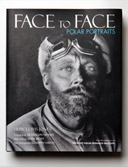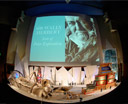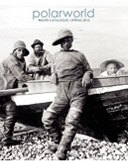 Our ProductsOur Resources |
This website requires the free Flash plugin to be installed.
Polarworld - discover more polar booksThe Arctic Book ReviewRace to the Polar Sea: The Heroic Adventures of Elisha Kent Kane Ken McGoogan Reviewed by Jonathan Dore This is the fourth of Ken McGoogan’s Arctic biographies. Like his earlier studies of John Rae and Samuel Hearne, Race to the Polar Sea shows the author portraying his subject in heroic terms. Although his book on Jane Franklin, Lady Franklin’s Revenge, showed that his biographical range could extend to subjects about whom he had very mixed feelings (she is something of a dark presence in the pages of his Rae biography, Fatal Passage), McGoogan is clearly more at home when able to give full admiration to his subject. Nothing unusual about that, you might think. But the emphasis on heroism can become somewhat wearing, and McGoogan’s continual cross-referencing of phases in Kane’s life to the archetypal stages of the “hero’s journey”, as laid out by Joseph Campbell in The Hero With a Thousand Faces, turns what might have been an intriguing aside into a somewhat heavy-handedly prescriptive exercise. More happily, in Race to the Polar Sea McGoogan abandons the unfortunate experiment with invented dialogue that marred his Hearne biography, Ancient Mariner. The main new information in the book comes from the newly discovered manuscript of part of Kane’s journal from his second expedition (or at least, it is newly available to researchers, having been sequestered in a private family archive until recently), which McGoogan is the first writer on Kane to make use of, and this fact alone should make the book worth reading for all with an interest in the explorer. The background of jealously guarded family privacy is an important factor in Kane studies, since Elisha’s father John Kane was an overbearing paterfamilias obsessed with family honour—someone who, as a judge with high political connections, was even willing to jail his own son Thomas for writing a letter critical of his father’s conciliatory stance on slavery. In light of this, and Elisha’s long agonizing over what would happen if his parents discovered his liaison with his lover Maggie Fox, McGoogan seems justified in assuming that the manuscript journals and correspondence that survive today have been heavily redacted, since no papers preserved by the family mention Fox, and Elisha’s letters to her survive only because she published them herself (in an effort to gain some income after the family had shamelessly reneged on the clear instructions in Elisha’s will that royalties from his last book should go to her). Yet the author seems to overlook a simpler explanation for the lack of references to Maggie in the new manuscript journal: that Kane probably assumed that at some point ill-health would oblige him to seek his family’s help in working on the manuscript journal to produce the published version (as they had with his earlier book), and he had thus decided from the start to avoid all reference to Maggie. McGoogan does his job with efficiency and verve, and Kane’s life story is one that any biographer would relish. Raised in the upper echelons of patrician Philadelphia, his lifelong struggle with rheumatic fever seemed to spur him to live life to the full, taking risks that a man with better chances of a long life might have sensibly shied away from. In the Philippines he climbed down into a volcanic caldera, and during the Mexican–American War he helped overcome a Mexican unit his detachment had stumbled on, then prevented its officers from being slaughtered, and treated their wounds. Add in two Arctic expeditions, and it seems like a life scripted by Hollywood. Perhaps “scripted” is not far off, since Kane’s fiercely driven ambition to become famous seems to have led him to seek out such situations precisely so that they might make exciting copy in the mass media of his own time—newspapers and magazines, and above all in books (naturally enough written by himself). In an ironic twist of fate, the financial independence from his family’s sometimes suffocating grip that his last book would have given him arrived just too late, as he finally succumbed to his rheumatic fever in Havana. But his stately progression by train from New Orleans to Philadelphia, mourned by thousands at every stop, would surely have pleased him. His family’s grip might have been suffocating, but it was a suffocation he embraced more often than he rebelled against it. Right up until his death at the age of 37, and long after he had become a respected national figure, he lived in thrall to a father whose presumed disapproval of his relationship with Maggie Fox seemed to infantilize him. His extreme reluctance to jeopardize his position within the family—always justified to himself as a reluctance to jeopardize his family’s position within polite society—is at such stark odds with his reckless spirit of adventure in every other respect that there is a strong sense of the precocious adolescent in his personality, even at the end of his life. Despite his taste for derring-do, a simple adult independence seemed to be lacking, the privileged upbringing taking away with one hand the taste for adventure and talent for leadership it had given with the other. McGoogan is perhaps guilty of rationalizing his subject’s behaviour towards Fox too readily, and too willing to accept the eminently plausible reasons that Kane himself advanced (Fox’s humble rural origins, rudimentary education, and spirit-rapping livelihood put her beyond the pale of Philadelphia’s polite society). David Chapin, in his Exploring Other Worlds (2004), has a less star-struck view of the relationship, and it is worth reading him to sense the contrast. Even if Kane had survived longer, the odds of him acknowledging Fox publicly while his father was still alive do not, on a sober view, look good. But Kane the serious scientist and polar explorer is a subject worthy of anyone’s admiration, most of all for his energy and exceptional leadership in maintaining by sheer force of personality a semblance of order among the dysfunctional crew of the Advance, and then leading them to safety when a third, and probably fatal, winter lay ahead of them. It is a matter of regret that he gave his unwavering belief, as did so many others, to a seductive idea that would, much later, prove false—the theory of the Open Polar Sea, hidden behind an encircling band of ice, on whose shores he imagined survivors from the Franklin expedition encamping as they awaited rescue. Yet ironically it was the belief in such a sea that gave impetus to Kane’s and other expeditions towards the North Pole, while if the truth had been known from the start—that it would be a 470-mile slog on foot across hummocky, shifting ice with neither land nor open water in sight—the dispiriting knowledge might have put anyone off attempting it in the first place. So much for the title’s “open sea”. What about the “race”? In fact there was no race to get there except, for a few days, in Kane’s head, when he thought Edward Inglefield was attempting to sail north into Smith Sound ahead of him (in fact Inglefield was headed for Lancaster Sound). So there was no race, and no open sea, but what the title does convey is the breathlessly aspirational trajectory that Kane mapped out both towards the North and in his life—an aspiration that finds its enthusiastic chronicler in Ken McGoogan. |
|
||
follow us  | join us | join us  | home | contact | home | contact
|
||||
|
© Copyright Polarworld Ltd
SiteWizard.co.uk Web Site Design Company |
||||


